Webinar (Wednesday, February 25): RevOps as a Strategic Growth Driver, with n8n, Polaris Ops, and Qobra
RegisterHow much time does your team waste reconciling spreadsheets and searching for missing approvals?
We know, the absence of transparent, up-to-date data is holding your sales force back! So imagine giving every sales rep instant visibility of their revenues. No more surprises at the end of the month, no more “black box” calculations. With real-time commission systems, this vision becomes your daily reality.
Instant payout tracking: Why does it work?
Sales organizations thrive on clear incentives and immediate feedback. Traditional commission workflows, manual Excel models, error‑prone calculations, siloed data, ead to:
- Delayed payments and disputes
- Wasted hours on reconciliation
- Demotivated reps unsure of their progress
By switching to an automated commission engine, you eliminate human error and latency. Teams see their earnings grow in real time, fostering trust and driving performance.
A new standard for accuracy and speed
Modern platforms automate the entire compensation lifecycle:
- Automated calculations: Commissions refresh instantly when sales data arrive.
- Scenario modeling: Test pay plan changes in a secure sandbox before going live.
- Instant notifications: Alerts keep reps and managers up to date on milestones and approvals.
💡 Good to know
Delaying commission statements can cost morale. Real‑time insight removes uncertainty and fuels healthy competition.

Key features of modern real-time commission software
Choosing the right solution means understanding the core capabilities that drive your ROI.
Automating commission calculations
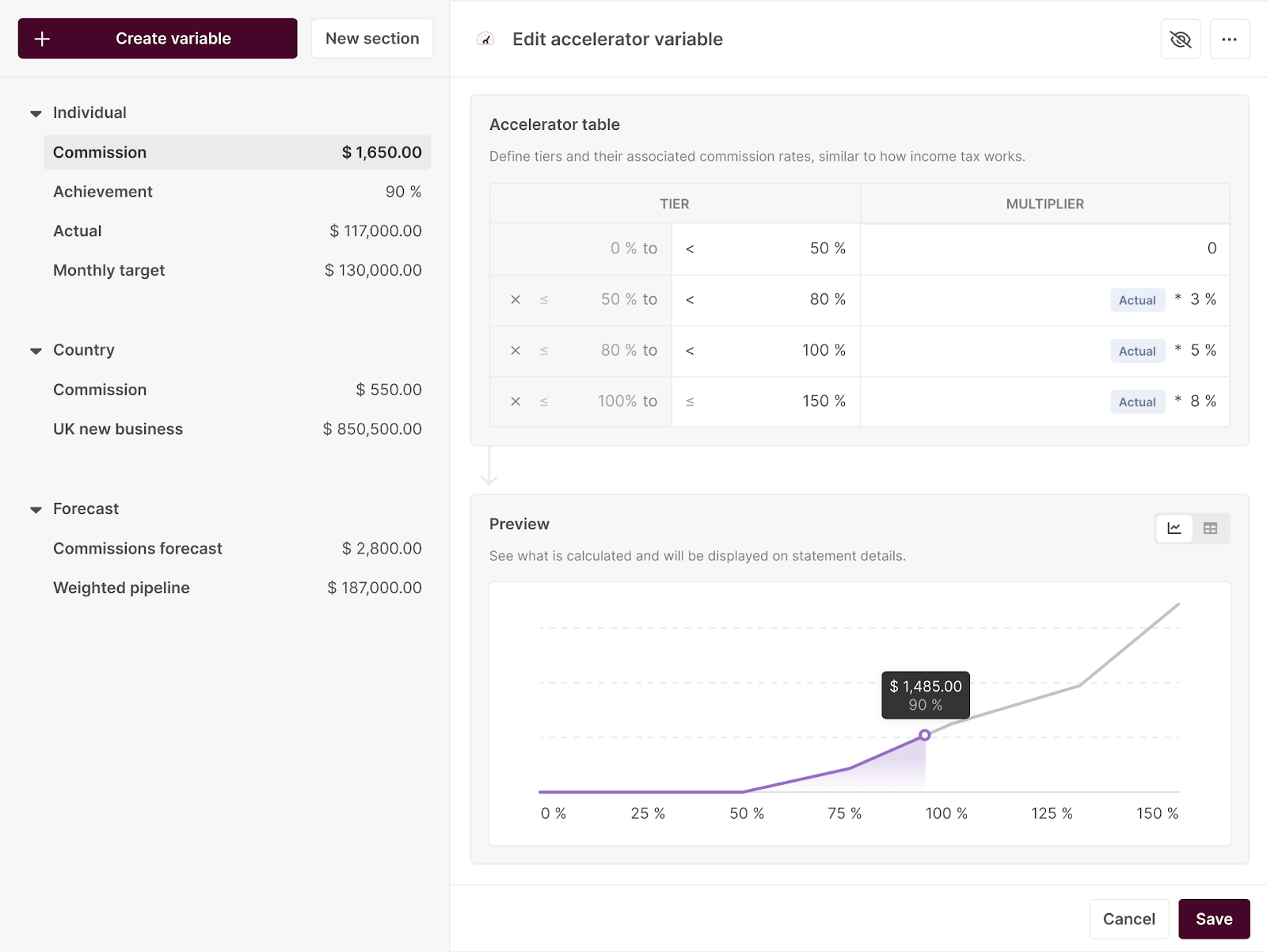
Gone are the days of manual formulas as a commission calculator and version‑conflict nightmares. A robust platform should:
- Support complex plan structures (tiered rates, accelerators, splits)
- Compute payouts dynamically as deals progress
- Archive historical plans and scenarios for audit
This automation not only saves time but ensures consistent accuracy across thousands of transactions.
“The biggest benefit is the calculation of variables, which is now automated. The second is reporting: the information that sales reps enter into our CRM. If they want to see that curve go up to 100%, the reporting has to be done correctly in the CRM. So it's a task we used to do on a daily basis, and it's been simplified thanks to the Qobra tool."
Paul Barret, Sales Ops at Glady
Seamless Integrations
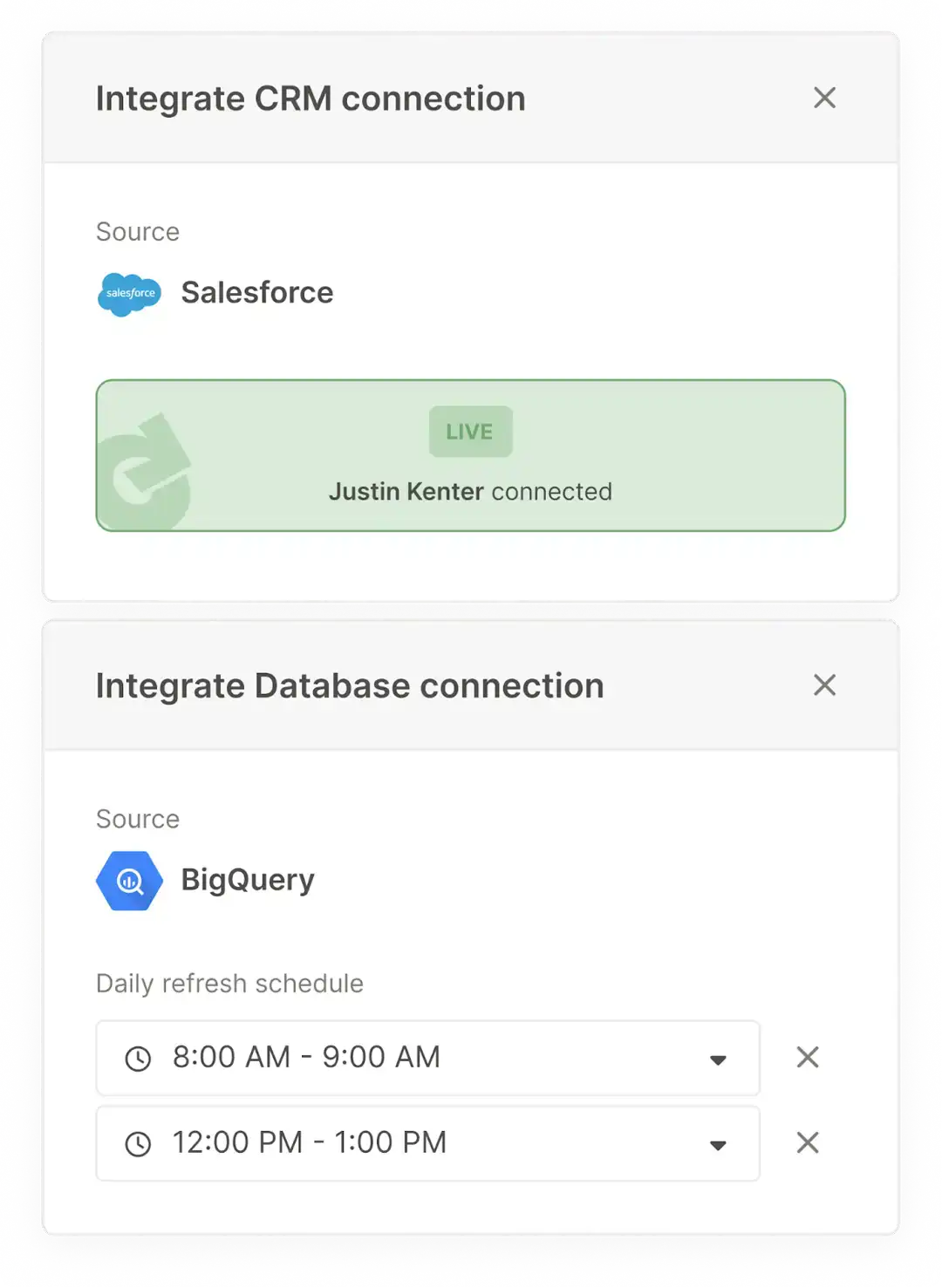
Your commission system should plug into existing data sources:
- CRM: Salesforce, HubSpot, Pipedrive, Zoho CRM, Odoo, Microsoft Dynamics, etc.
- HRIS and payroll: Workday, BambooHR, PayFit, Sage, Lucca, Hibob, Factorial, etc.
- Data warehouse: BigQuery, Snowflake, Redshift, PostgreSQL, etc.
- File storage: S3, SFTP, FTP, etc.
Frequent, scheduled data refreshes (up to four times per day) guarantee your reps see real‑time earnings without manual uploads.
“I only log in a few times a month to check that the integration with Salesforce is working properly and that the information sent automatically to Qobra is correct. Which it is, because now it only takes a few seconds to check and make sure that there won't be any issues at the end of the month.”
Clémentine Platel-Paris, Head of Sales Southern Europe at Spendesk
👉 Discover Qobra’s Integrations
Transparency & Visibility
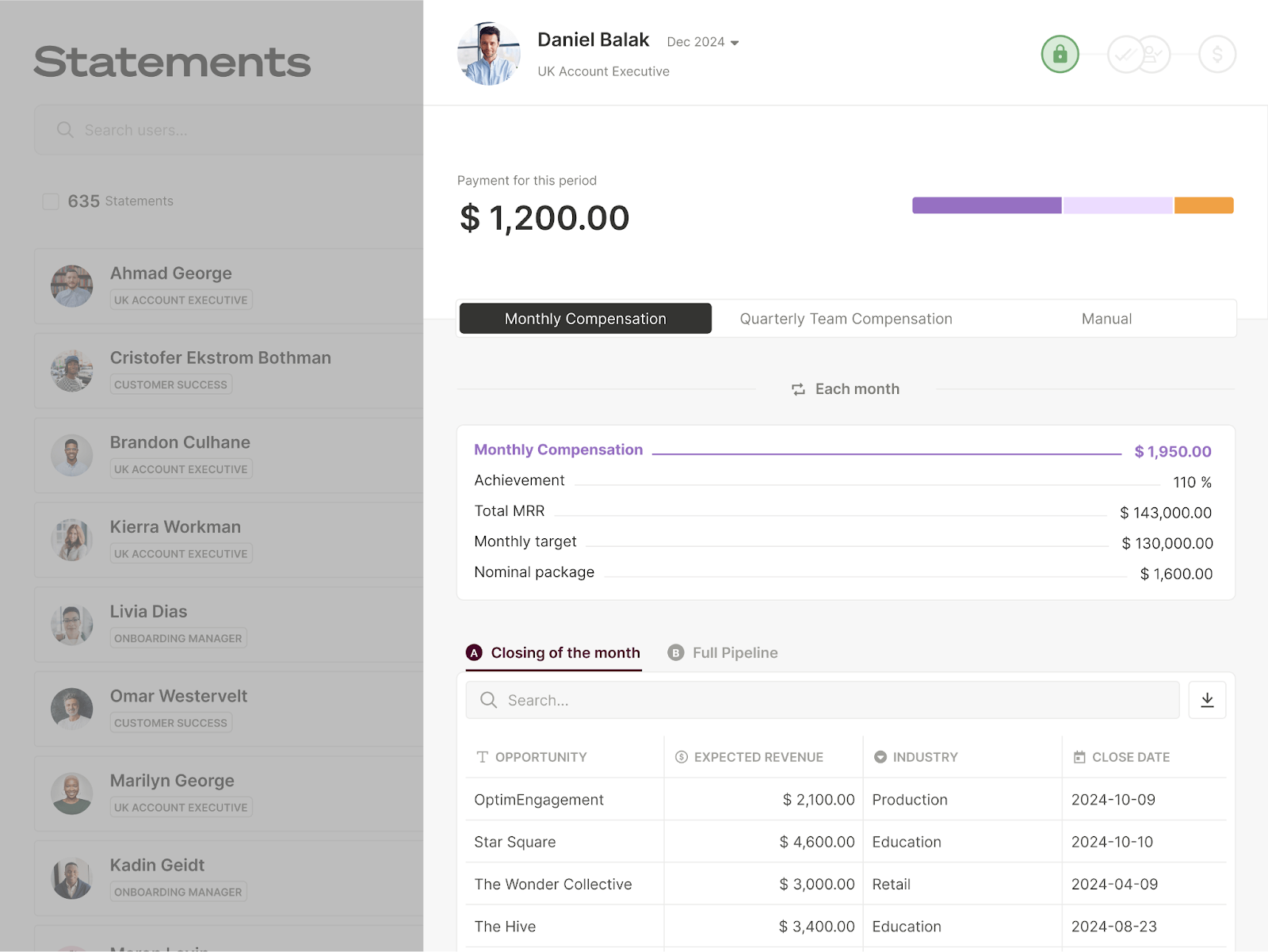
Intuitive dashboards are essential:
- Personal view: each rep tracks sales quota attainment, commissions, and bonus horizons.
- Manager view: aggregated metrics by team, territory, product line.
- Finance view: audit‑ready trails, exception tracking, commission letters auto‑generated on plan changes.
Visibility builds trust, reducing disputes and aligning all stakeholders on the same data.
“When a sales representative has questions about their commission, instead of taking time away from them and me, the visibility we have on Qobra allows us to get an answer almost instantly.”
Guillaume Call, Sales Director at Partoo
Collaborative validation
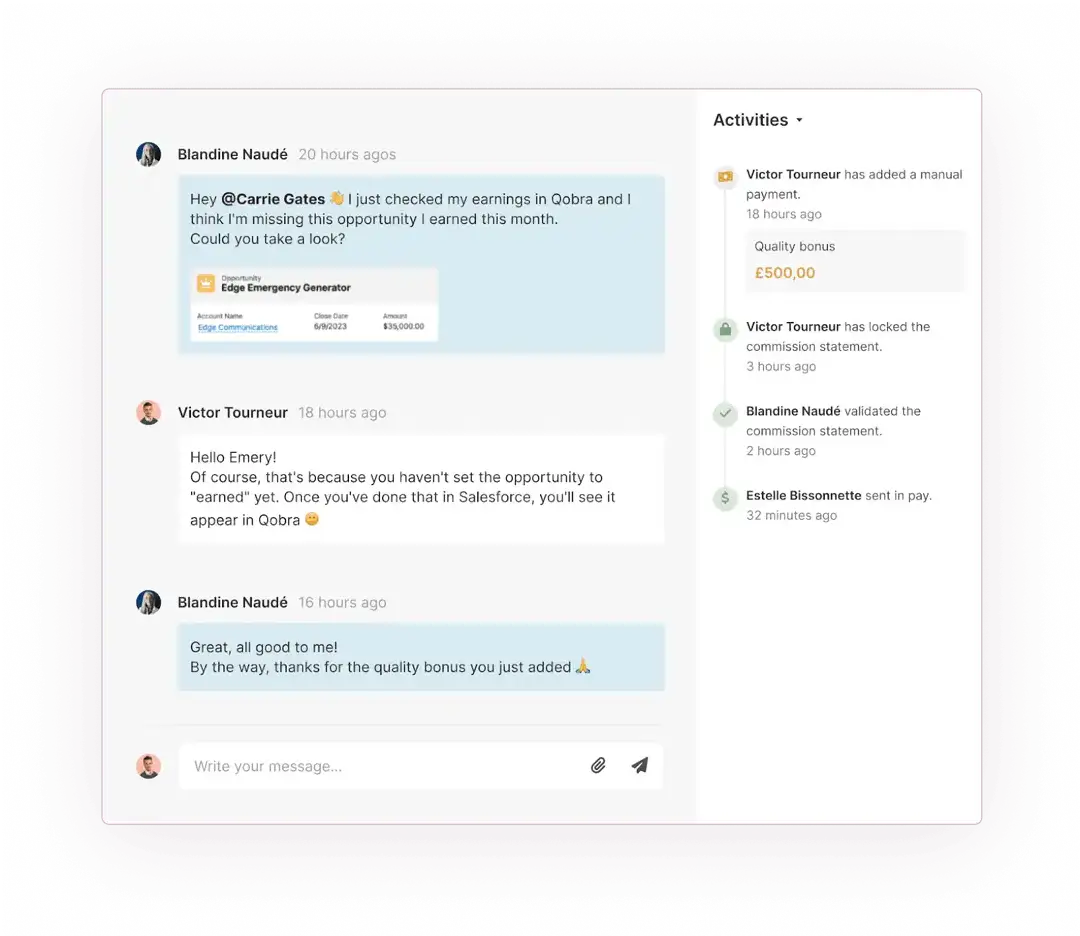
Smooth workflows mean everyone signs off at the right time:
- Multi‑level approvals by sales managers, HR, and finance
- In‑platform messaging to resolve exceptions
- Audit logs recording every adjustment
Without a controlled approval process, rogue edits can jeopardize data integrity. Ensure your system enforces role‑based permissions.
“The platform’s “Discussions” feature is very useful to us. It allows us to easily find all communications related to a commission, which is very practical when there are several stakeholders involved. It helps to streamline communication, improve collaboration, and save time.”
Marion Braud, Revenue Operations Expert at Mangopay
Advanced Reporting
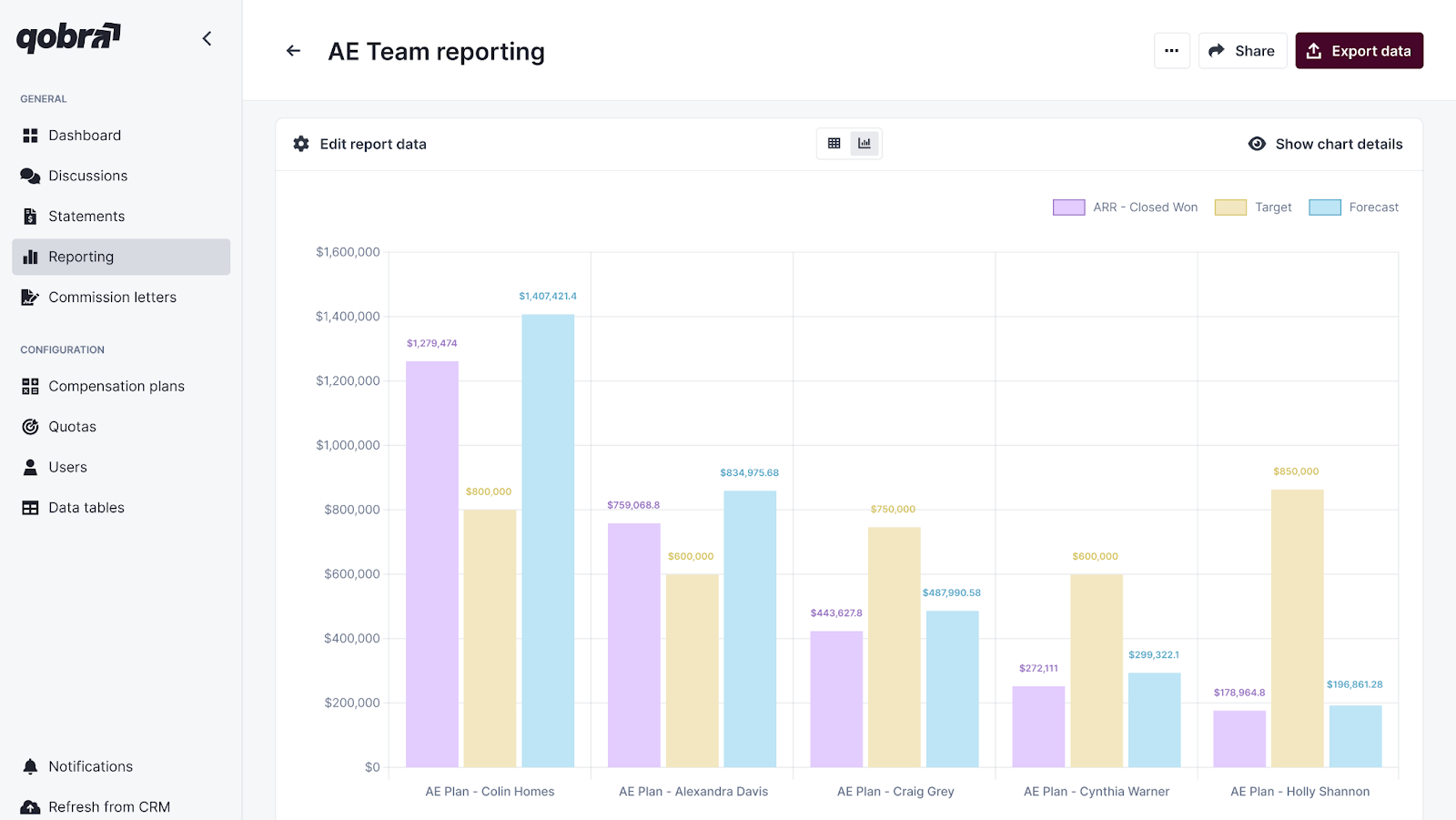
Deep insights fuel smarter strategy:
- Granular reports per rep, team, and period
- Custom exports (CSV, PDF, Excel) on demand
- Dashboards highlighting plan effectiveness and profitability
Reporting tools let you ask “What if?”—model the impact of new accelerators or territory shifts without writing a single line of code.
"Thanks to Qobra, I can simulate multiple plan change scenarios within an hour and get an accurate estimate of their financial impact."
Billy Guilleux, Financial Controller at Additi
Comparing Top Commission Tracking Solutions
To help you decide, here’s a high-level comparison of three leading platforms:
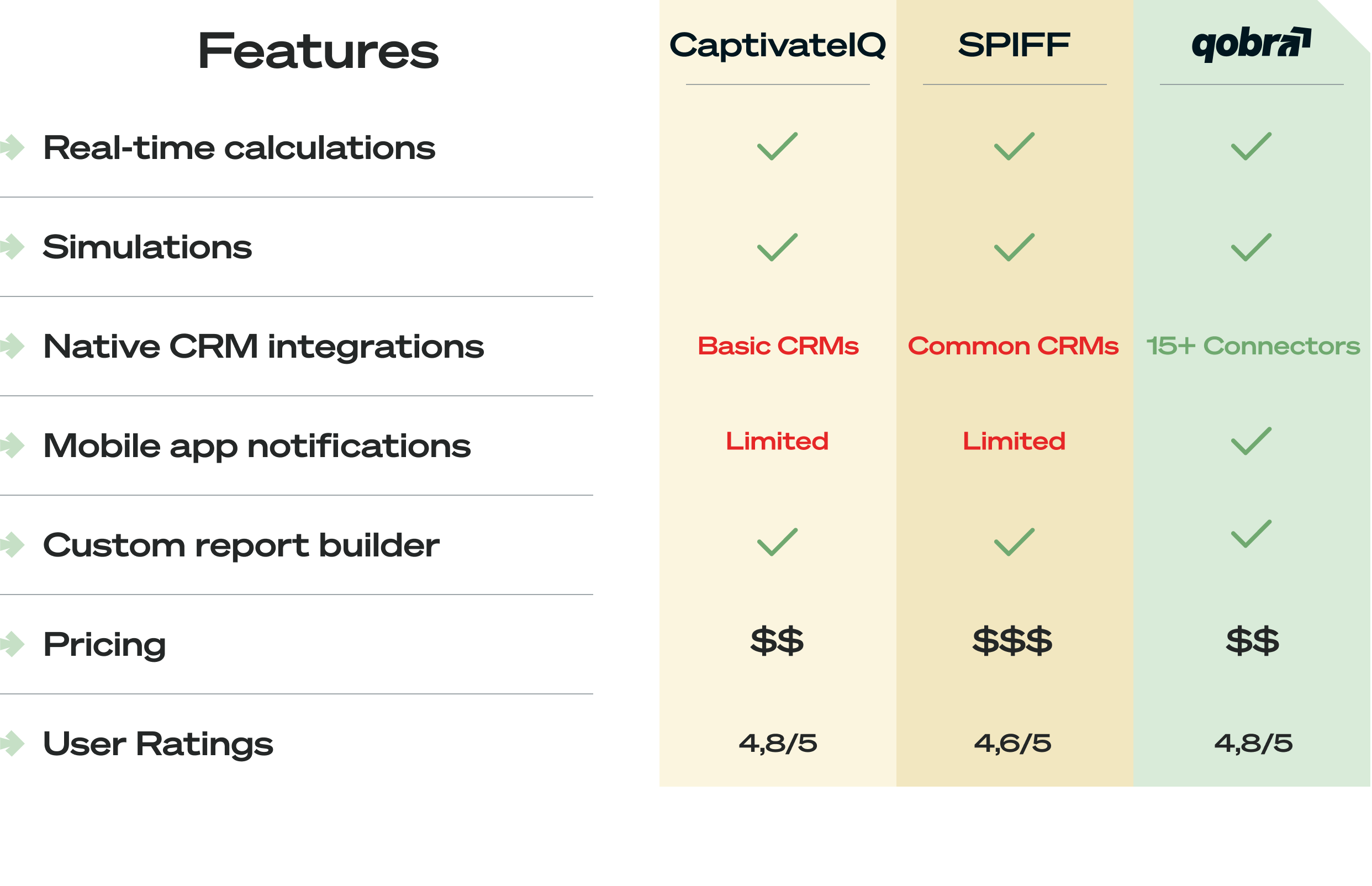
- For real-time calculations, deep integration & transparency: Qobra excels.
- For real-time, and complex plans: Spiff is a strong choice.
- For flexibility and advanced analytics: CaptivateIQ stands out.
All three platforms are recognized leaders in 2025, with robust automation, CRM integrations, and high user satisfaction
👉 Know more about the best sales commissions tools
Benefits of real-time commission insights
Organizations adopting instant commission tracking report:
- Time Saved: Reduction in admin hours.
- Increased Trust: Fewer disputes, more rep engagement.
- Boosted Productivity: Reps focus on selling, not on chasing statements.
- Data‑Driven Decisions: Finance models new plans with confidence.
- Scalability: Handle thousands of reps and complex hierarchies seamlessly.
💡 Best practice
Celebrate small wins, publicly recognize top performers as soon as commissions post. Real‑time data lets you reward momentum, not just month‑end totals.
How to choose the right commissions tracker software ?
Before committing, evaluate:
- Scalability: Can it handle your team size and plan complexity?
- Flexibility: Does it support unlimited plan types and changes?
- Ease of Use: Will non‑technical users design and update plans?
- Security: Are role‑based permissions and audit trails enforced?
- Support & Training: Access to documentation, onboarding, and ongoing help.
- Cost Structure: Subscription vs. per‑user pricing vs. one‑time license.
Always request a demo and pilot with your own data. A proof of concept using real transactions reveals hidden integration challenges.
Integrating with your existing systems
A seamless rollout depends on solid data pipelines:
- Map your current data sources (CRM, ERP, HRIS).
- Configure connectors and schedule automated syncs.
- Validate initial calculations against legacy models.
- Train teams on the new dashboards and approval flows.
- Go live in phases—start with one region or product line, then scale.
💡 Good to know
Successful integrations often leverage pre‑built APIs and ETL tools. Investing in this foundation ensures hours saved on manual exports translate directly into faster close cycles.

FAQ real-time commission tracking
What is real‑time commission tracking?
Real‑time commission tracking means payouts update instantly as sales data flows in, replacing periodic manual calculations with automated, continuous refreshes.
How does instant payout visibility boost sales?
When reps see immediate feedback on their earnings, they’re more motivated to close deals and optimize behaviors, leading to higher productivity and better retention.
Can I integrate commission software with my CRM and payroll?
Yes. Leading platforms offer native connectors for major CRMs (Salesforce, HubSpot), HRIS (Workday, BambooHR), and data warehouses (Snowflake, BigQuery).
What are typical costs for commission tracking software?
Costs vary from mid‑range subscriptions (per user or flat fee) to enterprise plans. Expect to budget based on team size, feature set, and integration complexity.
How do I ensure data security and compliance?
Look for role‑based permissions, audit trails, and encryption. A strong platform enforces multi‑tier approvals and stores a complete history of commission changes.
Can I model different compensation scenarios?
Absolutely. Sandbox environments let you simulate new plans and accelerators before rolling them out, so Finance and Sales can experiment without risk.







